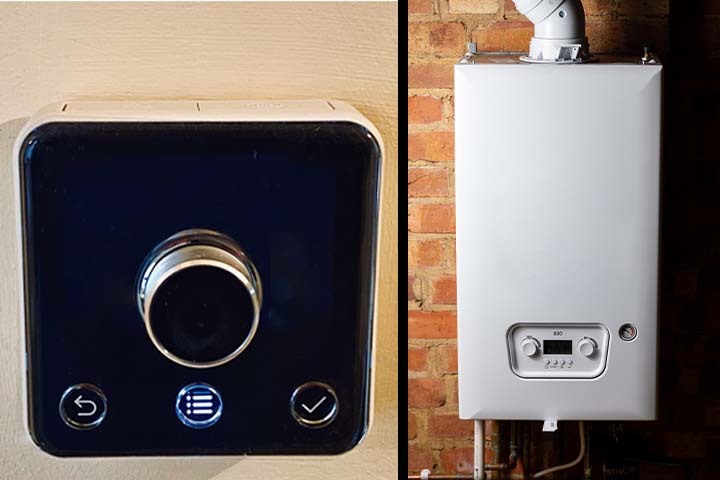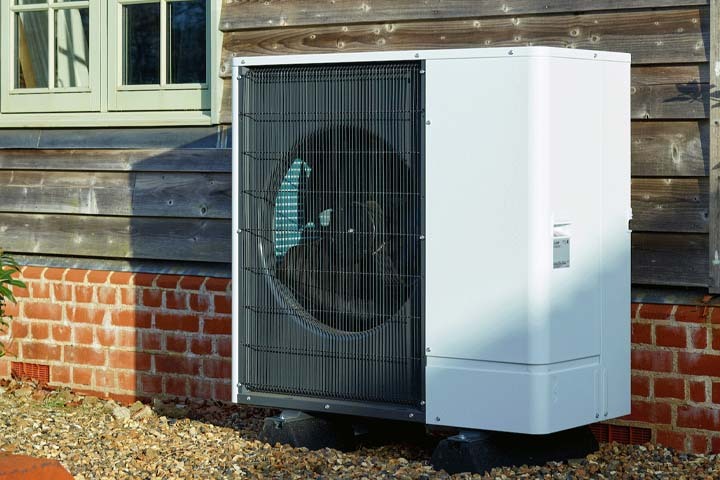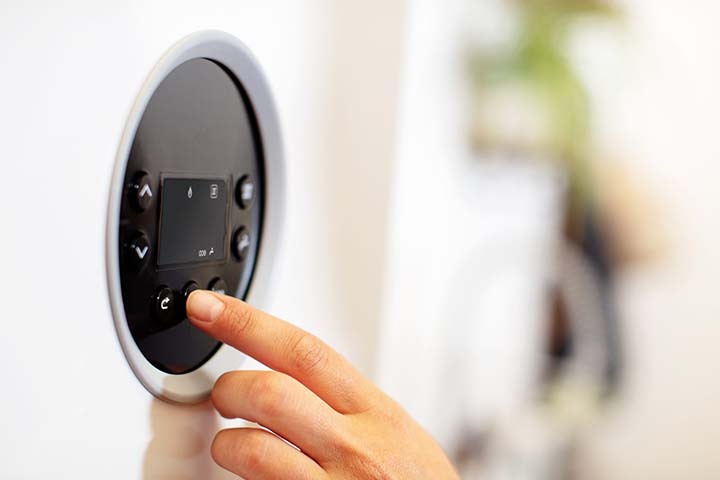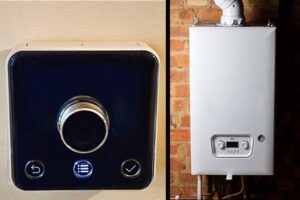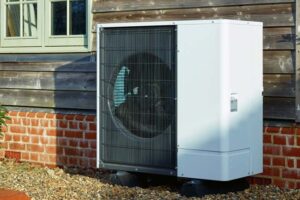Table of Contents
A combi or combination boiler is an integrated boiler system that is quick to heat both water to wash and also the central heating system. It does not have other pieces like the hot water storage cylinders which hence makes it compact and, therefore, customary among the homeowners in the UK. Indeed it is one of the most frequently installed boilers in the country.
Combi boilers are also very simple to install and can be easily housed in a kitchen unit or a boiler closet. They help you match the combi boiler with your home design by availing these features. Besides, it is also very convenient. Combi boilers are good because they heat water directly from the mains and hence deliver hot water at lightning speed. In this article, they will pay much attention to combi boilers, their subtypes, how they function, advantages, disadvantages, and finally the costs.
What type of heating is a combi boiler?
A combi boiler is a microbao role central heating system that provides both hot running water within the building and space heating. Combi boilers are quite straightforward systems. Mostly, they come in a format that is meant to be mounted on the walls of the house. The largest difference among their various types has to do with fuel. Currently, there are 4 main types of fuels for combi boilers: fossil fuel such as Natural gas, petroleum, LPG (Liquified Petroleum Gas), and electricity.
Gas combination boilers
Gas combination boilers are by far the most popular type of combi boilers in this country. It operates with natural gas supplied to households through the national gas network. Though natural gas is derived from carbon-based products it is cleaner than oil and coal.
Like all derivatives, while they emit CO2 whenever they are running, modern combi models have integrated condensing ability, making them excellent heaters. This technology helps to prevent the heat generally released out of the flue pipe from being re-circulated in the system.
Thus, energy use can be reduced, and, as a consequence, the environmental impact remains low while heating costs remain reasonable.

Oil combi boiler
An oil combi boiler is a better bet for standalone residences as the area’s central heating option. But they are not as compact as other combi boilers, which means that you would need to find a place to keep the fuel in an unlocked tank. You also have to order the fuel refills in regular intervals to avert running out of fuel.
Condensing technology is incorporated in modern oil combi boilers too. However, the emissions intensity of this fuel (expressed in kilograms of CO2 equivalent per kilowatt-hour) is still greater than that of gas.
LPG combi boilers
These boilers use Liquefied Petroleum Gas which is a by-product of natural gas and oil extraction. They are also ideal for off-grid structures and are more reasonable than oil while being slightly less polluting. LPG can be used with existing designs of gas boilers that are being produced by many manufacturers today.
Environmental Impact of combi boiler
Combi boilers are known to differ in their environmental footprint, but judging from the type of fuel they consume the general outlook can be determined.
For example, when comparing the results obtained from the same survey conducted by the Energy Saving Trust between gas, oil, LPG, and electricity across the United Kingdom, we can have certain assumptions from the emission intensity of each fuel.
Emission Intensity by Fuel (kilograms of CO2 equivalent per kWh) | ||
England, Scotland and Wales | Northern Ireland | |
Gas | 0.213 | 0.213 |
Oil | 0.298 | 0.298 |
LPG | 0.24 | 0.24 |
Electricity | 0.225 | 0.234 |
How does a combination boiler work?
However some combi boilers may induce other types of fuel, they operate almost in the same manner. Every time you need water or you need to heat your house, your combi boiler will ignite and heat the water that is transferred through pipelines all around your home.
In the course of this process, the water from the mains enters the drain at a low temperature and passes over a heat exchanger of exceptional efficiency. This heat exchanger separates and transfers approximately 90% or more heat from the burnt gas to cold water and then to taps.
The hot water goes to a diverter, and it can go directly to the pipes of your taps or directly out into the radiators. When in the radiators, the water is then returned in the circuit, re-heated, and reused all over again.
A combination boiler is another type that provides an endless supply of hot water, but if several outlets are opened, it causes a minor reduction in pressure. This makes the combination boilers to be suitable to be used with smaller households that have only one bathroom.
However, there are combi boiler models with the capacity factor of being able to provide sufficient heating and hot water demand for as many houses with four or five bedrooms and two or more bathrooms.
Advantages of Combi Boilers
Advantages of a Combi Boiler | Description |
Highly Efficient | Modern combi boilers are over 92% efficient due to condensing technology. This efficiency means that for every £1 spent, only 8p is lost in the heating process. Older boilers might be as low as 70-80% efficient. |
Money-Saving with Lower Energy Bills | High efficiency helps reduce energy bills significantly. Replacing a 70% efficient boiler with a 90%+ efficient combi boiler can save around £630 per year, depending on property size and boiler model. |
Hot Water on Demand | Combi boilers provide instant hot water by heating water directly from the mains, ensuring availability whenever needed. |
Small in Size | Combi boilers are compact and can fit within a standard kitchen cupboard. They don’t require storage cylinders or feed tanks, saving space and making installation quicker and easier. |

Disadvantages of Combi Boiler
Disadvantages of a Combi Boiler | Description |
Not Suitable for Large Homes with Multiple Bathrooms | Combi boilers may struggle to supply sufficient hot water for homes with multiple bathrooms used simultaneously. A system boiler may be a better option in such cases. |
Not Ideal for Homes with Weak Mains Pressure | Combi boilers rely on adequate mains pressure to deliver water flow. If mains pressure is low, an additional pump may be needed, though it comes with extra costs. |
Cost of a combination boiler
The cost prices for the new combi boilers provided are depending on the UK range from £500 to £3,000. Among the factors determining the price, we can list:
- The type of boiler manufacturer you decide
- You would like: budget, mid-price range, or premium
- The type of fuel
- The output rating of a combi boiler (the higher the better and therefore more costly)
You tend to pay more for the extra performance and a longer factory warranty if any also you get.
Furthermore, you have to factor in installation costs. Boiler installation costs across the UK vary and on average, it costs between a thousand, six hundred to three, five hundred pounds. The two main factors affecting the cost are:
- Different price levels of labor in some regions (commonly, this price is higher in big cities).
- The following describes the specific combi boiler replacement situation
As for the latter, it is cheaper to change an old combination boiler with a new one, than change a regular or a system boiler with a combi. It is in the last two cases that cylinders and feed tanks have to be taken away and the pipework altered.
Free Boiler Grants under the Eco4 Scheme
The UK government’s Eco4 scheme aims to provide free boiler grants for families that cannot afford to pay for energy-efficient systems. By this scheme, many people who meet the requirement for free boilers and heating system installations may be eligible to enjoy improved heating capacity in their homes and more efficient energy use.
For instance, combi boilers are very popular in the UK because they are small-sized, faster at heating water than producing a central heating system, and hence cheaper to install.
Frequently Asked Question
A combi boiler is a compact, energy-efficient unit that provides both central heating and hot water on demand without a separate tank.
Combi boilers heat water directly from the mains, instantly providing hot water for taps and radiators, without needing a storage cylinder.
The main types are gas, oil, LPG, and electric combi boilers, with gas being the most popular in the UK.


